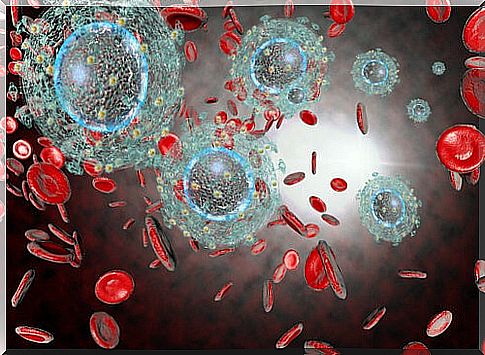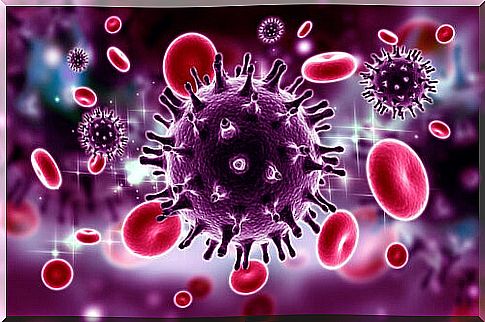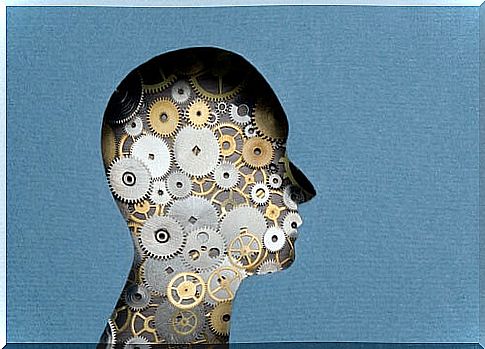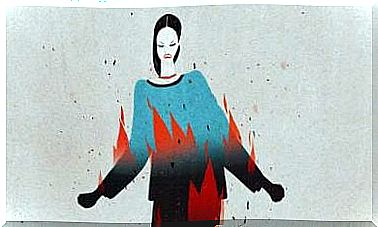Neuropsychological Disorders In People With HIV

The Human Immunodeficiency Virus (HIV) has been an important object of study in the health area for multiple reasons. First of all, the cases of people with this virus have increased exponentially. Likewise, there is a complex control of it, since until now a cure has not been found.
When the disease became known, these people were stigmatized. This is due, in large part, to the lack of awareness of it, thus affecting, not only those who suffer it, but also their closest circle. Although many campaigns have been carried out to help understand this disease, very few are aware of the existing alterations in the nervous system of people with HIV.

What is HIV?
To begin, it should be noted that HIV is a chronic condition caused by a virus. It can be transmitted through contact with: vaginal fluids, semen, blood and breast milk of the person who has it. It is of the progressive type and has an immunosuppressive effect on the body. As a consequence, it can cause disease in any organ or aggravate any simple infection.
On the other hand, it has been found that this disease has 4 phases:
- Acute retroviral infection.
- Asymptomatic carrier period.
- AIDS-related complex phase.
- AIDS case phase.
Within the treatments, physical and cognitive interventions must be taken into account . It usually begins with medical treatments, including: retroviral drugs and treatments to reduce or prevent infections. This is followed by nutritional support and education about the disease. Finally, psychological, neuropsychological and social support must be given.
Structural affectations
Being such a recent disease, there are almost more hypotheses than research. On the other hand, the short history of research on problems related to the central nervous system, both in structure and function , does not help either .
As a result, it has been found that there is unfocused damage to the cerebral hemispheres. These alterations occur mainly in the white matter of the frontal lobe and in the gray matter of the rest of the cerebral lobes. Thus creating problems for communication between neurons or weakening their connections.
Neuropsychological disorders
Several neuropsychological disorders have been identified in people with HIV. The first, and most prominent due to the degree of impairment, is cognitive slowing. This generates a progressive decrease in the speed with which the information is processed. Having an increase in reaction times, and therefore, increasing the execution time of cognitive tasks. The most relevant thing is that the problem increases as the difficulty of the task increases.
On the other hand, an impairment in visual memory has been found . Difficulties were identified for the recall of information that is displayed visually. Also, they found problems remembering details of a drawing made by themselves.
In addition, the executive functions are diminished in patients with HIV. As a result, difficulties were observed in abstracting information, relating terms, defining concepts, or solving problems in daily life.
Similarly, verbal memory is also penalized. The problems with this function are related to simple and complex information. That is, they show difficulties in learning numbers or words, but also, they show difficulties in remembering texts. The result is the forgetting of information that may be necessary or relevant for an adequate work or social performance.
Also, it is important to indicate that these difficulties can occur at different levels. This depends on factors such as: cognitive reserve, protective factors or genetic factors. Even so, it is necessary to work on these problems, as it would help to postpone the evolution to HIV-associated dementia.

HIV-associated dementia
In the most severe cases, HIV patients can develop dementia. They show a severe impairment in cognitive functions, significantly impairing the development of basic and complex activities. As a consequence, they have to quit their job and become dependent on other people.
In the same way, some much more marked emotional symptoms begin to be observed , among which this: apathy, irritability, depression or anxiety. Thus creating greater difficulties in the proper management of the disease by family members.
This type of dementia, depending on the characteristics it shows, can be classified as subcortical. That is, the main damage occurs in white matter and in subcortical regions of the brain such as the internal nuclei, thalamus, among others. As a consequence, medical treatments become more limited.
conclusion
In conclusion, it can be indicated that HIV is a disease that affects multiple aspects of the person. Therefore, there is a decrease in aspects of physical and mental health. In this case, it is important that the treatment is done in a multidisciplinary way, taking into account aspects: medical, nutritional, psychological, neuropsychological and social.
In addition, it must be understood that working on neuropsychological disorders is of vital importance. Not only because it decreases their abilities, but in the long term, they can increase problems and evolve into dementia. By having these two conditions, your quality of life will decrease even more, increasing the chances of stigmatization.
In this sense, it is relevant that we all make an effort to understand this disease, in order to avoid stigmatization of the people who suffer from it. This will not only help the person to feel better, but the rest of us will understand the best way to help them overcome obstacles.









